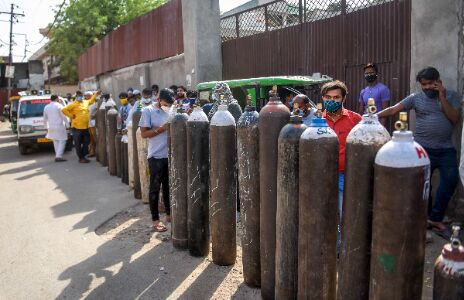Ensure 700MT supply to Delhi continues, says SC

New Delhi: After the Centre on Wednesday ensured 730MT of liquid medical oxygen to the Capital, following stern orders from the Supreme Court and the Delhi High Court, the top court on Thursday asked the Central government to make sure that the demand of 700MT in the city is met on a daily basis with Justice DY Chandrachud telling the Centre that 700MT "toh aapko dena hi padega (700MT supply to Delhi a must)".
This came even as the bench reserved the matter for orders on Thursday after the Centre and the Delhi government exchanged blows with each other over whether this supply should continue daily till an oxygen audit can be set up.
While the Centre pushed for an oxygen audit to determine the actual demand in the Capital, the Delhi government pushed for the courts to maintain the pressure on the Centre so that the supply of 700MT continues.
Moreover, senior advocate Rahul Mehra, for the Delhi government sought that the country-wise allocation of oxygen be relooked as many states such as Madhya Pradesh and Maharashtra were receiving more than their demands.
At this point, the Supreme Court came down hard on the Centre over its purported one-size fits all formula to calculate oxygen demand. The court said that there were many variables that judges had noticed but the government had not and that this formula needed a complete relook. But till that time, the court maintained during the hearing that the Centre must continue 700MT supply to Delhi every day.
The court asked the Centre not to reduce oxygen supply to Delhi from 700MT till further orders and ensure that rationalisation exercise is completed while taking into account the pan-India perspective.
The top court said that people in Delhi are dying despite efforts being made to treat COVID-19 patients and there is also no denying that many have lost their lives due to a shortage of oxygen supply.
However, arguing for the Centre, Solicitor General Tushar Mehta told the court that ensuring 700MT supply to the Capital every day would result in shortages in other states, the consequences of which the Centre will not be responsible for. He went on to press for an oxygen audit in the city so that the real demand can be ascertained.
Mehta said that the unloading of oxygen tankers brought to Delhi is taking too long as the vehicles need to be sent back for refilling to the eastern corridors.
Moreover, during the hearing, the court continued to press for the Centre to create a buffer stock of oxygen all the while maintaining that the country needs to be prepared for the third wave of COVID-19, which could be more harmful to children according to experts.
"Why are you not creating a buffer stock? If as you claim, Delhi is not using or needs 700MT and only 490MT is needed, then this excess 200MT can be used to create a buffer stock," the bench told Mehta.
There can be a centralised pool of buffer stock, like if any hospital runs out of the oxygen, then it can immediately contact to replenish its supply which can save lives and avoid creating panic, it said.
The top court also said the Centre will also have to consider the situation not only in small cities and metropolitan cities but also in rural areas where people are suffering for want of oxygen.
In addition, the Narendra Modi government told the top court that the people of the country had given their mandate to it twice and it understands people suffering due to COVID-19 and making every possible effort to augment the supply of oxygen at the highest political level.
It rebutted the Delhi government's accusation that oxygen allocation is being done arbitrarily and favoured the creation of an effective mechanism to deal with the allocation and distribution of oxygen to the states. The apex court was told that the Delhi government has made it a "Centre versus Delhi fight".
Significantly, during the hearing, the SC-appointed Amicus Curiae, agreed with the Delhi government and the court that the supply of 700MT oxygen to Delhi cannot be allowed to be lowered till a scientific formula for the allocation is devised.



